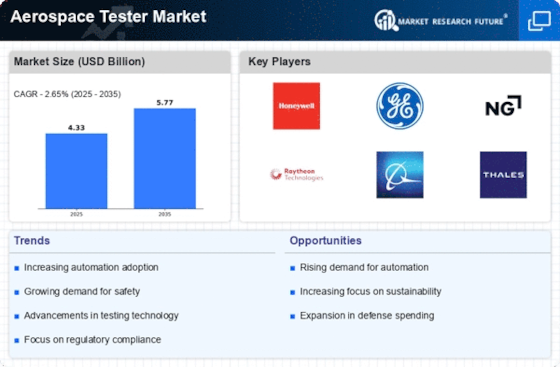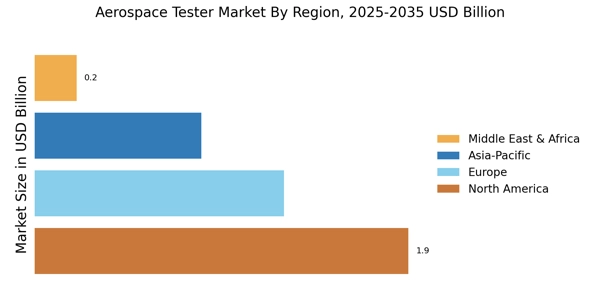Increased Complexity of Aerospace Systems
The aerospace tester Market Industry is significantly influenced by the increasing complexity of aerospace systems. As aircraft and spacecraft incorporate more sophisticated technologies, the demand for comprehensive testing solutions rises correspondingly. Modern aerospace systems often integrate advanced avionics, propulsion systems, and materials that require specialized testing protocols. This complexity necessitates the development of more advanced testing equipment and methodologies to ensure compliance with regulatory standards. Market data suggests that the demand for testing services related to complex aerospace systems is expected to increase by approximately 10% annually. This trend underscores the critical role of testing in maintaining safety and performance in an evolving aerospace landscape.
Regulatory Compliance and Safety Standards
The Aerospace Tester Market Industry is heavily influenced by stringent regulatory compliance and safety standards imposed by aviation authorities. These regulations necessitate rigorous testing of aerospace components and systems to ensure they meet safety and performance criteria. As regulatory bodies continue to update and enforce these standards, the demand for reliable testing solutions is likely to increase. The market for aerospace testing services is projected to expand as manufacturers seek to comply with evolving regulations. Recent statistics indicate that compliance-related testing services could account for up to 30% of the total aerospace testing market by 2026. This trend highlights the importance of maintaining high safety standards in the aerospace sector.
Growing Demand for Aerospace Testing Services
The Aerospace Tester Market Industry is witnessing a growing demand for testing services driven by the expansion of the aerospace sector. As the number of aircraft and aerospace projects increases, so does the need for comprehensive testing to ensure safety and reliability. This demand is further fueled by the rise of new entrants in the aerospace market, including startups focused on innovative aircraft designs. Market analysis indicates that the aerospace testing services segment is expected to grow at a rate of 8% annually, reflecting the industry's commitment to quality assurance. This growth presents opportunities for testing service providers to expand their offerings and enhance their capabilities in response to market needs.
Technological Advancements in Testing Equipment
The Aerospace Tester Market Industry is experiencing a surge in technological advancements that enhance testing equipment capabilities. Innovations such as automated testing systems and advanced simulation tools are becoming increasingly prevalent. These technologies allow for more efficient and accurate testing processes, which are essential for meeting stringent safety and performance standards. The integration of artificial intelligence and machine learning into testing protocols is also noteworthy, as it enables predictive maintenance and real-time data analysis. According to recent data, the market for advanced testing equipment is projected to grow at a compound annual growth rate of approximately 7% over the next five years. This growth is indicative of the industry's commitment to improving testing methodologies and ensuring the reliability of aerospace systems.
Focus on Sustainability and Environmental Impact
The Aerospace Tester Market Industry is increasingly focusing on sustainability and minimizing environmental impact. As the aerospace sector faces pressure to reduce its carbon footprint, testing solutions that assess the environmental performance of aerospace systems are becoming more critical. This includes testing for fuel efficiency, emissions, and the use of sustainable materials in aircraft design. The market for sustainable aerospace testing solutions is projected to grow significantly, with estimates suggesting a potential increase of 12% in demand over the next few years. This trend reflects a broader commitment within the aerospace industry to adopt environmentally friendly practices and technologies, thereby influencing the development of testing methodologies.

















